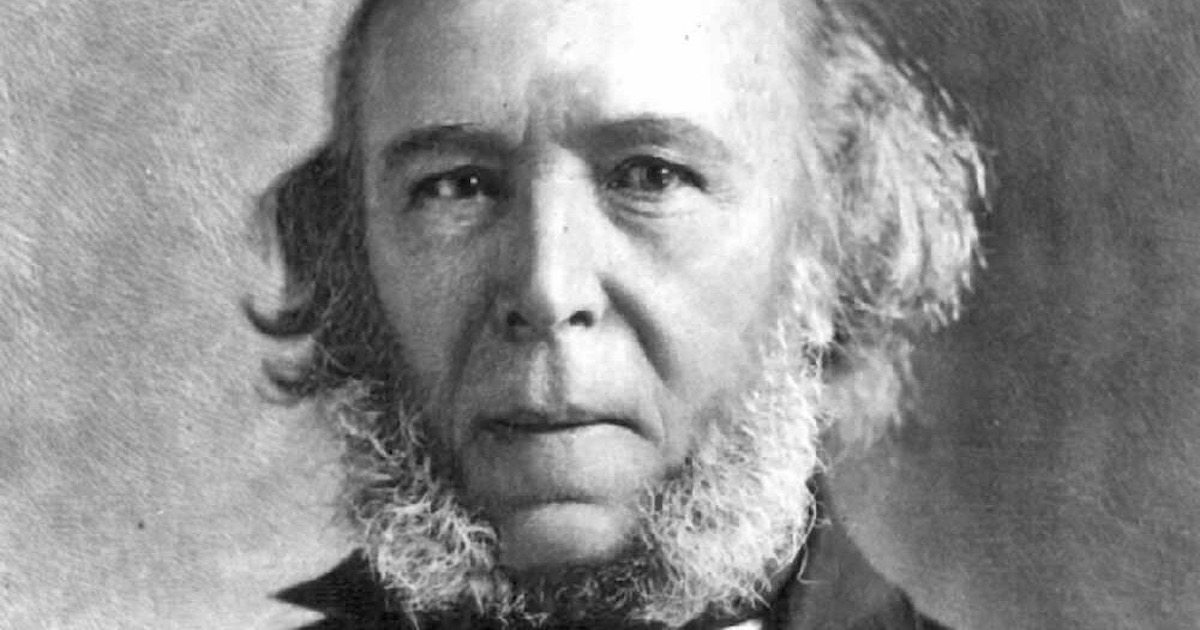 Culture & Ethics
Culture & Ethics
 Evolution
Evolution
Cambridge University Press’s New Book on Social Darwinism: Darwin and Herbert Spencer

Cambridge University Press has released a short new book by Jeffrey O’Connell and Michael Ruse on Social Darwinism that is likely to infuriate quite a few people of varying persuasions. The authors admit that Darwin was a racist who promoted racial struggle, even in his scientific book, The Descent of Man, where Darwin exulted that “the civilized races have extended, and are now everywhere extending, their range, so as to take the place of the lower races.” (quoted on p. 24) They also admit that Darwin was living off capitalist wealth, and he opposed unions and co-ops because they reduce human competition.
After exposing the ruthless social Darwinist views of Andrew Carnegie and Teddy Roosevelt, the authors later claim that these men’s ideas were “more complex.” Carnegie was not all bad, after all, because he used his wealth to benefit people by founding libraries and such, while Roosevelt “seems not quite the Anglo-Saxon bully one might infer on a quick reading.” (30) These are not exactly “politically correct” observations. I also suspect that E. O. Wilson, the Pulitzer Prize-winning Harvard biologist who founded sociobiology, would not be pleased to be called an “unreconstructed Spencerian,” in contrast to Ruse, one of the authors of this book, who tries to take the high ground by claiming to carry the mantle of true Darwinism.
Four Key Issues
As a historian, however, what troubles me most about this book are four key issues: 1) The authors distance Darwin and Herbert Spencer (and Ruse and Wilson) a little more than seems warranted. 2) The authors’ desire to remove Hitler from the ranks of social Darwinists is completely misguided. 3) Except for Darwin, the authors never discuss the social Darwinist views of biologists, focusing instead on industrialists, military men, and politicians. 4) The authors’ interpretation of Nietzsche is idiosyncratic and rather bizarre. In this post I will address the first issue, then I will discuss Hitler’s social Darwinism in my next post, and finally I will discuss social Darwinism among scientists.
However, I will refrain from discussing their strange interpretation of Nietzsche, because the authors don’t consider him a social Darwinist, I don’t consider him a social Darwinist, and I don’t know anyone who considers him a social Darwinist (and I’ve read pretty extensively the literature about social Darwinism, and the literature about the influence of Darwinism on Nietzsche). After reading this book, I was completely mystified about why Nietzsche was even included (and the chapter on Nietzsche is much longer than most other chapters), until I discovered later that O’Connell’s dissertation was on Nietzsche. OK, it doesn’t fit the topic, but it’s a hobby horse. Now I get it.
In any case, back to Darwin and Spencer. O’Connell and Ruse are surely right to point out differences between Darwin and Spencer. The most important difference, they explain, was their views on ethics. O’Connell and Ruse state, “Darwin was a moral non-realist. He believed in substantive ethics, but he didn’t think it had any external justification.” (11) Spencer, on the other hand, embraced the following position, according to the authors: “It is the prospect of progress that justifies the struggle for existence in the social world, permitting a laissez-faire society of the harshest kind.” (14) Toward the close of this book the authors state, “For Spencer, progress, holism and moral realism were all important. For Darwin, progress was secondary and derived, and individualism and moral non-realism were both important.” (62)
I admit that this is largely correct, but I wonder how much of a difference this made in their social and political views (the topic at hand here is, after all, social Darwinism). At one point the authors admit that Darwin’s “social beliefs and prescriptions were not that much different from Spencer.” (23) Also, even though Darwin’s view of progress may have been “secondary and derived,” unlike Spencer’s, where it was central, nonetheless, Darwin’s desire to foster further evolutionary progress did influence his socio-political perspective.
Drenched with Notions of Progress
The closing pages of The Descent of Man, where Darwin is discussing the future prospects of humanity, are drenched with notions of progress. For instance, Darwin stated:
Man, like every other animal, has no doubt advanced to his present high condition through a struggle for existence consequent on his rapid multiplication; and if he is to advance still higher he must remain subject to a severe struggle. Otherwise he would soon sink into indolence, and the more highly-gifted men would not be more successful in the battle of life than the less gifted. Hence our natural rate of increase, though leading to many and obvious evils, must not be greatly diminished by any means. There should be open competition for all men; and the most able should not be prevented by laws or customs from succeeding best and rearing the largest number of offspring.
(Darwin, The Descent of Man [Princeton: Princeton University Press, 1981], 2:403)
That sounds a lot like Spencerian progress to me.
Indeed, Darwin’s position in this passage stresses the ineluctable nature of the struggle for existence even more than Spencer did. Spencer thought that as humans progressed, human reproduction would diminish to the point that the struggle would no longer be applicable in the future. Darwin in this passage asserted that reproduction “must not be greatly diminished by any means” and that humans “must remain subject to a severe struggle.” Thus, Darwin emphasized the beneficence of the human struggle for existence even more than Spencer did. (For more on this theme, see my essay “Was Darwin or Spencer the Father of Laissez-Faire Social Darwinism?” Journal of Economic Behavior and Organization 71 [2009]: 20-28.)
Their presentation of Darwin and Spencer, however, is a rather minor point compared to the completely misguided chapter on “The Hitler Problem,” which I will address in my next post.
